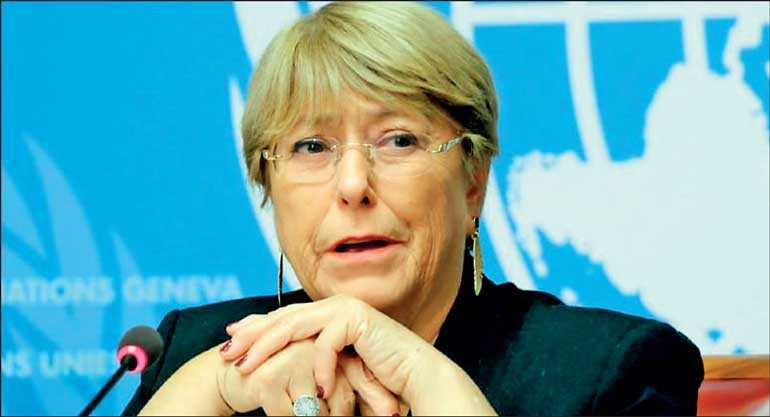Sunday Feb 15, 2026
Sunday Feb 15, 2026
Wednesday, 17 February 2021 00:00 - - {{hitsCtrl.values.hits}}

UN High Commissioner for Human Rights Michelle Bachelet
 What is terribly missing is the necessity of reconciliation. Further, there is no other constructive analysis or recommendation in the Report of the UN High Commissioner for Human Rights. Almost all others are negative, destructive, or punitive.
What is terribly missing is the necessity of reconciliation. Further, there is no other constructive analysis or recommendation in the Report of the UN High Commissioner for Human Rights. Almost all others are negative, destructive, or punitive.
There are 11 recommendations prescribed to the Government of Sri Lanka, but nothing on the question of devolution, the Provincial Council (PC) system, or holding of elections to the PCs as soon as possible. Why?
This is surprising in a context where neither the present Government nor the last Government have failed to hold elections to the nine Provincial Councils. They are at present defunct as people’s representative councils particularly affecting the regions and remote provinces where people are largely minorities, poor, and without basic amenities. The terms of office of the nine provinces ended in the following order.
Sabaragamuwa and Eastern – September 2017
North Central – October 2017
Central, North Western, and Northern – September 2018
Southern and Western – April 2019
Uva – September 2019
The Provincial Council system was introduced to the Constitution of Sri Lanka in 1987 through the 13th Amendment (13A) with an understanding and agreement between the Sri Lankan and the Indian governments as a way of reconciliation to the minority-majority problems, devolution and taking care of the people affected by too much centralisation of the administration and financial resources. In a recent visit to Colombo, India’s External Affairs Minister S. Jaishankar has raised the issue again with his counterpart, Dinesh Gunawardena, in a friendly and a constructive manner.
Under the PC system, the Tamil community could administer at least one council (the Northern), if not two (Northern and Eastern), and influence several others (Central, Western and Uva). The Muslim community could administer or influence another council (the East) in partnership with the Sinhalese or the Tamils. All depend however on how the people use their franchise and the representatives behave after that.
The failure to hold elections to the provincial councils is a fundamental human rights question or a violation at present that the Office of the High Commissioner has completely failed to understand. Sri Lankans have the right to exercise franchise at three levels: local, provincial, and national. Any breach in this respect at any level is a fundamental violation of rights. It is possible that the High Commissioner or her advisors have gone along with the extremist sections of the Tamil community who expresses the view that provincial councils are useless for their purposes.
When C. V. Wigneswaran (a judge turned politician!) was the Chief Minister of the Northern Provincial Council (2013-2018) he used it for his extremist political objectives without utilising the opportunities to serve the people or to pursue reconciliation. He formed a new party and passed a genocide resolution 2015.
The Office of the High Commissioner perhaps is going in that direction. All these are extremist politics. These are some reasons why the people particularly in the South have some misgivings on the provincial council system on their part. Of course, the Sinhala extremists are also against provincial councils advocating an extremely centralised unitary state.
Otherwise, the PC’s are the best institutions to address the grievances of the minorities, the rural people, and the marginalised sections of the Sri Lankan society without harming the rights of the majority. Of course, there are certain limitations and technical difficulties in the laws and administration.
These should be and could be sorted out through negotiations, reforms, and cooperation. In my opinion, the vision that could be followed is cooperative devolution. This means the cooperation between the centre and the provinces through formal meetings, discussions, and dialogue.
A cooperative devolution model also does not exclude the possibility of strengthening the centre or national security to prevent extremism and possible terrorism. When the matters like education, health and regional development are devolved, the national Government has more opportunities to focus on security, national economic development, international relations and shipping and trade in the present context.
The Finance Commission is an important element in the devolution architecture. As Article 154R (3) of the Constitution says, “The Government shall, on the recommendation of, and in consultation with, the Commission, allocate from the Annual Budget, such funds as are adequate for the purpose of meeting the needs of the Provinces.” The principles on which these allocations should be implemented are explained very clearly as follows (para 5).
“The Commission shall formulate such principles with the objective of achieving balanced regional development in the country, and shall accordingly take into account – (a) the population of each Province; (b) the per capita income of each Province; (c) the need, progressively, to reduce social and economic disparities; and (d) the need, progressively, to reduce the difference between the per capita income of each Province and the highest per capita income among the Provinces.”
Unfortunately, the potential of the provincial councils has never been utilised properly by anyone in the north or the east. It is more unfortunate that the current Report of the High Commissioner for Human Rights has completely ignored the principles of devolution and the provincial council system in Sri Lanka. If there were any positive recommendation to the Government in the Report, a priority should have been given on the provincial council system and holding elections with mutual understanding between all communities as soon as possible. ‘Be positive and be constructive, without being politically biased’ is the simple advice that the people could offer the UN High Commissioner for Human Rights.